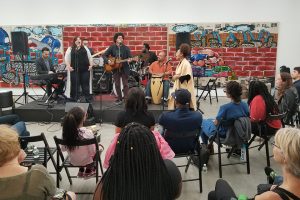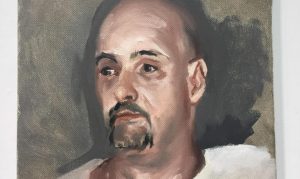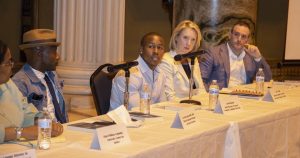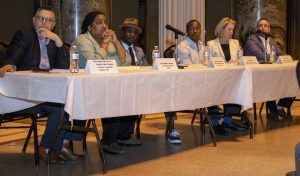The 9th Annual Beyond the Bars Conference of the Center for Justice at Columbia University will focus on both the incarceration and criminalization of women and girls themselves as well as of their families and communities. Our focus is inclusive of transgender, non-binary, and gender non-conforming people. The many struggles for justice, equity and safety led by women and girls directly impacted by the criminal legal system will be at the heart of the conference as we create a space to further strengthen and advance change. Beyond the Bars 2019 will continue developing the collaboration between universities and the many ongoing efforts to end mass incarceration.
It is our hope that this conference will bolster efforts to challenge the impacts of incarceration and criminalization on women and girls in the following ways:
- Convene and support a national and international network of women and organizations to share and advance resources
- Help articulate and amplify a feminist vision and analysis
- Address difficult issues and questions within the movements to end gender-based violence and criminalization and incarceration
- Strengthen and amplify the growing voices and roles of directly impacted women and girls
- Enhance the knowledge and skills for a broad range of change makers
- Further catalyze university involvement in the struggle to end mass incarceration
Sunday March 10, 2019, the fourth day of the Beyond the Bars conference will feature a collection of ninety minute organizing workshops. These sessions are designed to facilitate learning about relevant issues, skill sharing, and the development of tools for advocacy and organizing to actively engage in justice work as it pertains to the impacts of criminalization and incarceration on women and girls. It is our intention that the workshops offer a chance to further understand the nuances and dynamics of womens’ and girls’ struggles in connection to mass incarceration. Also, to teach new tools for advocacy and organizing and to connect participants to opportunities for continued engagement beyond the conference. What skills do you wish more people had? What do people need to know in order to contribute more effectively to your work? What are the concrete steps people can take today to support the work that you’re doing? We are particularly committed to highlighting the voices and organizing led by: people of color, women, queer and transgender people, non-binary and gender non-conforming people, young people, and people directly impacted by incarceration and the criminal legal system.
We are interested in proposals that facilitate learning about the issues,skill sharing, and the development of tools for advocacy and organizing around a broad range of issues related to women and girls impacted by mass incarceration and criminalization. These include but are not limited to:
- Strategies to decrease the number of women and girls detained and incarcerated
- Impacts of incarceration on women and girls in and out of prison and jail
- Addressing and supporting women in the community who are impacted by the incarceration of family members
- Criminalization of survivors of domestic violence, sex trafficking, and forced sex work
- School to prison pipeline and the criminalization of young women and girls
- Addressing the mental and physical health of women and girls impacted by incarceration and criminalization
- Experiences and needs of LGBTQI, non-binary, and gender non-conforming people under correctional control
- Supporting women and girls impacted by immigration policies
- Practices and tools that support a healing process for women and girls who have been impacted by incarceration and criminalization
- Building coalitions to organize, advocate and support women and girls impacted by incarceration
- Strengthening the parental rights for mothers who are incarcerated or returning home from incarceration
- Public advocacy specifically designed to empower women and girls with involvement in the criminal justice system
- Campaigns and initiatives related to ending mass criminalization, incarceration and supervision of women and girls
- Approaches to prison abolition
- Restorative and transformative justice
We invite proposals for workshops that address one or more of these related topics and skills.
In your proposal, please emphasize tangible takeaways for participants and the ways you will facilitate this through active participation and/or gaining a deeper understanding of an issue.
Accepted proposals will be interactive and bridge the gap from analysis to action. We are especially excited about workshops that provide the opportunities and/or resources for continued involvement after the conference weekend—either through one’s individual actions or through involvement with a group.
All workshops will be 90-minute blocks and take place on Sunday, March 10, 2019 at Columbia University School of Social Work.
Please include in your proposal: the materials you will need for your workshop (e.g. projector, paper, markers, etc.)
To submit a proposal, please fill out this form by Friday, February 1, 2019 at 11:59PM EST.
Please feel free to reach out to us with any questions or comments at: [email protected]









